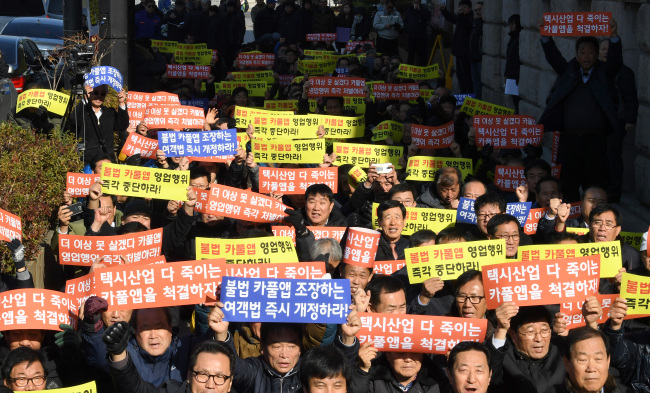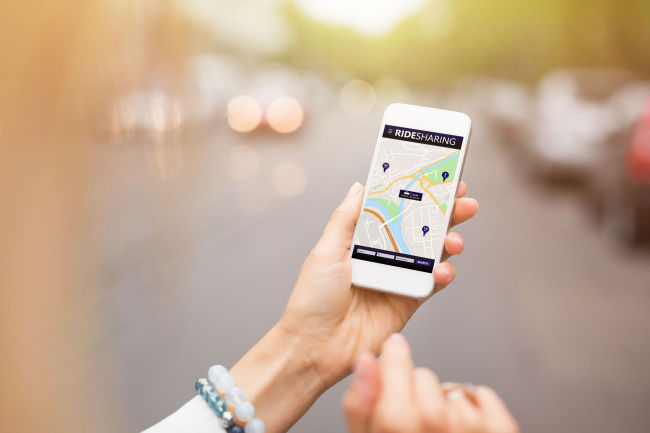South Korean taxi drivers have begun staging protests against the carpooling industry’s recent decision to operate their services around the clock, escalating controversy over the legality of providing commercial 24-hour carpooling services here.
More than 400 unionized taxi drivers staged a protest in front of Seoul’s City Hall on Tuesday, calling for the government to “terminate illegal carpooling services that threaten the taxi industry” ahead of a public hearing on the issue.
A similar protest took place in front of the National Assembly on Monday, which led to the cancellation of a discussion on policy reform for startup growth scheduled for that day.
 |
Members of Seoul’s representative taxi unions stage a protest over the legality of 24-hour carpooling services in front of Seoul’s City Hall on Tuesday. (Yonhap) |
The standoff came as Seoul-based ride-sharing app operator Poolus has begun running its services at any time of the day, instead of during selected commute hours on weekdays.
The change had prompted the Seoul Metropolitan Government to request a police investigation into the startup for breaching the transportation law, on grounds that carpooling services available around the clock are no different from commercial taxi services.
Korea’s transport law prohibits unlicensed vehicles -- essentially personal vehicles not officially registered as taxis -- from operating paid driving services, with the exception of carpooling activities during commute hours.
Until recently Poolus and other carpooling app operators had run their services from 5 a.m. to 11 a.m. and 5 p.m. to 2 a.m. on weekdays only, under the conventional interpretation of commute hours.
However, Poolus recently decided to remove such time restrictions and make its ride-sharing services available at any time, claiming that “commute hours” can be interpreted more broadly to account for flexible work hours and lifestyle patterns.
With the change, a Poolus driver is now able to select any eight hours during the week, including weekends and holidays, to offer carpooling services.
 |
(123RF) |
The Seoul city government has asserted that permitting carpooling services to operate at any time defies the law’s initial purpose -- to ease heavy traffic during peak commute hours. Permitting unlicensed vehicles to operate like commercial taxis also poses safety risks, it said.
Likewise, the traditional taxi industry argues that 24-hour carpooling services are illegal and a major threat to their business.
“Less than one year since Uber’s termination in Korea, mobility service apps like Poolus, Luxi and UberShare, which circumvent Korea’s transport laws by manipulating the carpooling exception clause, have been quickly growing,” the Seoul Private Taxi Association said Monday.
“Illegal mobility services have been expanding without proper regulation, causing massive damages to the taxi industry,” it said.
Korea’s carpooling industry as well as the tech startup community have responded to the current situation with heavy criticism, claiming that local mobility regulations are backward and outdated.
They believe the municipality’s actions are out of line with its stated pledge of boosting new businesses that shape the “fourth industrial revolution” -- a new, connected digital economy buttressed by new technologies and innovative business models.
Despite the need for constructive discussion of the issue, attempts to open talks have been unsuccessful so far, igniting calls for the Ministry of Land, Infrastructure and Transport and Seoul City to take a more active stance in solving the issue.
Korea has been struggling with how best to implement the “shared economy” business model, particularly in the smart mobility sector, which has struggled to take root here.
The biggest example is the private ride-hailing app Uber. Despite its success in other markets, Uber had to suspend its flagship private ride-hailing UberX services in Korea after being charged with breaching transport laws.
According to the “Startup Korea!” report released by McKinsey & Company this year, 70 percent of the world’s top 100 startups that had raised the most in investments in 2016, including Uber and Airbnb and fintech firm Ant Financial, would find their business models illegal or noncompliant with Korea’s regulations.
By Sohn Ji-young (
jys@heralcorp.com)









